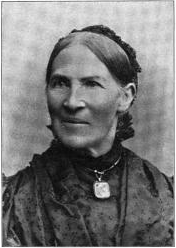Hedevig Rosing facts for kids
Hedvig Rosing (born May 16, 1827 – died November 30, 1913) was a special teacher and writer from Norway. She was born in Denmark. She helped start schools and fought for women's rights. Hedvig was very good at teaching children who were deaf or couldn't speak. She was also the first woman to teach in public schools in Copenhagen, Denmark.
Contents
Her Life Story
Early Life in Denmark
Hedvig Sophie Rosing was born on May 16, 1827, in Horsens, Denmark. Her father, Ulrik Frederik Rosing, was a priest. Her mother was Ursula Sophie Lasson. Hedvig grew up in Central Jutland. There, she worked as a governess, teaching children in their homes. In 1860, she made history. She became the first woman teacher in the public schools of Copenhagen.
Moving to Norway
In 1865, Hedvig traveled to Norway to visit her family. On September 9 of that year, she married her cousin, Anton Rosing. He was a teacher at an agricultural school in Norway. Hedvig then moved to Norway to live with him. Sadly, just two years later, her husband passed away. She became a widow.
After her husband's death, Hedvig moved to Oslo. In 1868, she started teaching at an elementary school there.
Teaching Deaf Children
In Oslo, Hedvig learned about important issues. These included women's rights and challenges for teachers. She met Fredrik Glad Balchen. He was a pioneer in teaching deaf people. Balchen had created a special way to teach deaf students. In 1872, Hedvig became a teacher at Balchen's school.
While working there, she came up with her own idea. She wanted to start a school for deaf children. Her school would use a "purer oral method." This method focused on teaching deaf children to speak. In the summer of 1880, she received money from the government. She used it to visit several countries. She wanted to study how they taught deaf people. She was the only person from the Nordic countries to attend a big meeting about deaf education. This meeting was called the Second International Congress on Education of the Deaf.
Starting Her Own School
In 1881, Hedvig decided not to open a small family school. She could not get enough government help for it. This was because of a new law about schools for special needs. However, with some government money, she opened her own school. It was called Fru Rosing's Speech School for Deaf-Mute. "Fru" means "Mrs." in Norwegian.
Her school used the "pure speech method." It first opened in a place called "Little Bloksbjerg" in Briskeby, Oslo. Three years later, it moved to "Høien" near St. Hanshaugen. Hedvig managed her school until 1895. When she retired, she received the largest pension a woman had ever been given in Norway. A pension is money paid regularly to someone after they retire.
Hedvig was also part of a special school committee. She was the only woman on this committee. It was set up by Minister Johan Sverdrup. Their job was to help prepare a new law about public schools in 1889.
Her Writings
Hedvig Rosing published several books. She put together two collections of her late husband's writings. These were called Ungdomstid og Reiseliv (1869) and Anton Rosings Alvorsliv (1871). She also published her father's story. It was about his work as a priest helping Danish-Norwegian prisoners of war in Great Britain. This was during the years 1807 to 1814.
She also wrote many articles about folk life and history. Two of her school books were very popular. These were Barnets første bog (1879), which means "The Child's First Book," and Veiledning ved undervisning i samtidig læsning og skrivning efter lyd- og stavemethoden (1879). This second book was a guide for teaching reading and writing using sound and spelling. She also wrote many papers about teaching deaf children. She wrote articles about children's education, teachers, women's education, and women in society.
Fighting for Women's Rights
Hedvig Rosing was a leader in Norway's women's suffrage movement. This movement worked to get women the right to vote. She worked with other important women like Fredrikke Marie Qvam, Gina Krog, and Aasta Hansteen. In 1908, she was one of the Norwegian representatives. She attended a big meeting in Amsterdam about women's right to vote. It was called the Fourth Conference of the International Woman Suffrage Alliance.
Hedvig was also a member of several groups. These included the National Windmill Association and the Norwegian Association of Deaf Teachers. She was also part of The Deaf Association in Kristiania (Oslo). She served on the board of the Oslo Døveforening until 1896.
Hedvig Rosing passed away on November 30, 1913, in Oslo. She is buried there in the Cemetery of Our Saviour with her husband.
Awards
- 1907, Citizens' Council Medal in Silver
Selected Works
- Ungdomstid og Reiseliv. Udvalg af Anton Rosings Breve og Optegnelser, 1869
- Anton Rosings Alvorsliv. Et Minde, 1871
- Livet paa de engelske Fangeskibe 1807–14, 1875
- Billed-A.B.C. i Farvetryk, 1876
- Nogle Ord om de Døvstumme, 1878
- Barnets første Bog. Med 58 Billeder, 1879 (20th edition 1916)
- Veiledning ved Undervisning i samtidig Læsning og Skrivning efter Lyd- og Stave-Methoden, 1879
- Om Døvstummes Undervisning, 1883
- Udkast til Læsebog for Døve Børn i de første Skoleaar, 1884
- Udkast til Læsebog for døve Børn i Mellemklassene, 1887
- En liden Religionsbog til Skolebrug, 1890
- 1878–1903. De døves forenings 25-aars jubilæum. Et festskrift, 1903
See also
 In Spanish: Hedevig Rosing para niños
In Spanish: Hedevig Rosing para niños
 | John T. Biggers |
 | Thomas Blackshear |
 | Mark Bradford |
 | Beverly Buchanan |


